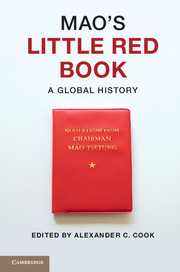Book contents
- Frontmatter
- Contents
- List of illustrations
- List of contributors
- Preface
- 1 Introduction
- 2 A single spark
- 3 Quotation songs
- 4 Mao quotations in factional battles and their afterlives
- 5 Translation and internationalism
- 6 Maoism in Tanzania
- 7 Empty symbol
- 8 The influence of Maoism in Peru
- 9 The book that bombed
- 10 Mao and the Albanians
- 11 Partisan legacies and anti-imperialist ambitions
- 12 Badge books and brand books
- 13 Principally contradiction
- 14 By the book
- 15 Conclusion
- Index
- References
14 - By the book
Quotations from Chairman Mao and the making of Afro-Asian radicalism, 1966–1975
Published online by Cambridge University Press: 05 June 2014
- Frontmatter
- Contents
- List of illustrations
- List of contributors
- Preface
- 1 Introduction
- 2 A single spark
- 3 Quotation songs
- 4 Mao quotations in factional battles and their afterlives
- 5 Translation and internationalism
- 6 Maoism in Tanzania
- 7 Empty symbol
- 8 The influence of Maoism in Peru
- 9 The book that bombed
- 10 Mao and the Albanians
- 11 Partisan legacies and anti-imperialist ambitions
- 12 Badge books and brand books
- 13 Principally contradiction
- 14 By the book
- 15 Conclusion
- Index
- References
Summary
We must give active support to the national independence and liberation movement in countries in Asia, Africa and Latin America as well as to the peace movement and to just struggles in all the countries of the world.
War and PeaceA defining moment in the history of US radicalism’s Maoist turn remains Black Panther Party (BPP) founder Bobby Seale’s recollection of the role of Quotations from Chairman Mao in building the Panthers’ organization and ideology. As Seale recalls it, in early 1967 he and Huey Newton came up with the idea of purchasing sixty copies of the Little Red Book from China Book Store in San Francisco in order to sell them for $1 apiece on the University of California Berkeley campus. The money was to be used to purchase weapons to arm BPP members against police brutality on the streets of Oakland. Ideologically, Seale writes, the book also became the Panthers’ urtext for internationalizing black struggle in the USA:
Me and Huey and the brothers in the core organization used the Red Books and spread them throughout the organization, because Huey made it a point that the revolutionary principles so concisely cited in the Red Book should be applied whenever they could . . . Huey would say, “Well, this principle here is not applicable to our situation at this time.” Where the book said “Chinese people of the Communist Party,” Huey would say “Change that to the Black Panther Party. Change the Chinese people to black people.” When he saw a particular principle told in the Chinese terms, he would change it to apply to us.
- Type
- Chapter
- Information
- Mao's Little Red BookA Global History, pp. 245 - 265Publisher: Cambridge University PressPrint publication year: 2014
References
- 4
- Cited by

